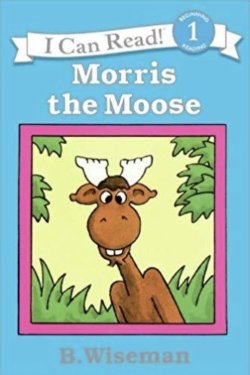Gareth B. Matthews

Review of Morris the Moose by B. Wiseman (Scholastic Book Services, 1973). Originally published in Thinking: The Journal of Philosophy for Children 1(2): 2-3.
Morris meets a cow. “You’re a funny-looking moose,” he says.
“I’m a cow,” the cow protests; “I’m no moose.”
Morris persists. “You have four legs and a tail and things on your head,” he points out.
“You ‘re a moose,” he concludes.
“But I say MOO,” the cow objects.
Morris is unimpressed. “I can say MOO, too,” he boasts.
Still the cow is not stumped. “I give milk to people,” she says; “moose don’t do that.”
Morris remains unimpressed. “So,” he says, “you’re a moose who gives milk to people. ”
The cow makes one last point. “My mother is a cow,” she says.
Morris is unfazed. “She must be a moose,” he rejoins coolly, “because you’re a moose.”
Next Morris and the cow meet a deer, who thinks they are all deer. You can predict the dialogue that results. Finally, Morris, the cow and the deer walk over to a horse, who greets them with “Hello, you horses.”
The plot of this little story could hardly be simpler; yet the questions it raises are very profound. Suppose someone called a moose a cow? or a horse a moose? What would be wrong with that? Would anything be wrong with that?
Conceived in one way the problem raised is the problem of the distinction between essential and accidental properties. An essential property of Morris is a property Morris can’t lose; without ceasing to exist, and also, perhaps, one that Morris couldn’t fail to have had. By contrast, an accidental property is one he can lose without ceasing to exist and one he might never have had.
Is “having things on your head” essential to being a moose and so, for Morris, essential to existing? If so, then certainly the horse is not a moose. Is lacking antlers only accidental to being a horse? If so, then perhaps Morris is an antlered horse.
The problem of essential and accidental properties is a problem of meta physics. Some of the issues it raises can also be conceived as problems in taxonomy – how to classify things.
To discuss biological taxonomy one needs to know something about evolution and something about variety in the biological world, including, among other things, what will mate with what! One can, however, discuss principles of taxonomy and many of the associated philosophical issues with nonbiological examples, too.
Over dinner one evening I put this question to my family:
What questions can you think of that are like these, two:
Is a bicycle a tricycle without one of the wheels?
Is a snake a lizard without legs?
Here are some of the responses I got:
Is a bicycle a motorbike without a motor?
Is a mouse a bat without wings? Is a chair a rocker without runners?
Is a skirt a dress without a top?
Whimsical questions of this sort can serve to introduce a thoughtful discussion of the practical and philosophical problems of taxonomy. So can a delightful thought experiment like Morris the Moose.
John Perry begins a recent article with this story:
I once followed a trail of sugar on a supermarket floor, pushing my cart down the aisle on one side of a tall counter and back the aisle on the other, seeking the shopper with the torn sack to tell him he was making a mess. With each trip around the counter, the trail became thicker. But I seemed unable to catch up. Finally it dawned on me. I was the shopper I was trying to catch.
Perry uses this story to raise interesting questions about the logic of belief. What exactly is the belief I come to have when (supposing the story above is about me) I come to believe that I am the one who is making the mess? It is not the belief that the only philosopher in the supermarket that day is the one who is making a mess, since I could have the first belief and not realize that I am the only philosopher in the supermarket. Nor is it the belief that Gary Matthews is the one who’s making the mess, for I might realize that I am the one who is making the mess and not know (perhaps because I am suffering from amnesia) that I am Gary Matthews.
Perry could also have used this story to introduce another philosophical puzzle. How can it be that, as in the story, I am “seeking the shopper with the torn sack to tell him he was making a mess”? If that were right, I would be seeking myself to tell myself that I am making a mess, since I am the shopper with the torn sack. But I am not seeking myself and I have no wish to tell myself that I am making a mess.
Perry’s story may remind us of Winnie-the-Pooh and his attempt to catch a Woozle. In that story Piglet comes upon Pooh, who is walking around in a circle. There ensues this exchange:
“Hallo!” said Piglet, “what are you doing?”
“Hunting,” said Pooh.
“Hunting what?”
“Tracking something,” said Winnie the-Pooh very mysteriously.
“Tracking what?” said Piglet, coming closer.
“That’s just what I ask myself. I ask myself, What?”
“What do you think you’ll answer?”
“I shall have to wait until I catch up with it,” said Winnie-the-Pooh… ”
Pooh’s idea that he will have to wait to see what he finds before he will know what he is tracking is attractively plausible. Suppose he discovers that it is a new and unheard-of creature called a “Woozle” that is making those tracks. Then it is a Woozle he is tracking. Of course, as things actually turn out, it is Pooh himself who is making those tracks (at least the first ones; when Piglet joins him Piglet naturally adds tracks of his own). But how can it be that Pooh has to wait until he “catches up with it” to say what it is he is tracking? He never catches up with himself.
Is Pooh, in fact, tracking himself? Surely even Pooh realizes that it is stupidly futile to track oneself. Is he then tracking the creature that made those tracks? But he is the creature that made those tracks.
“I have been Foolish and Deluded,” says Pooh at the moment of enlightenment; “and I am a Bear of no brain at all.” Maybe so. But understanding Pooh’s foolishness and being clear about what enlightenment in this case could consist in, taxes the wisdom of even the wisest philosopher.
